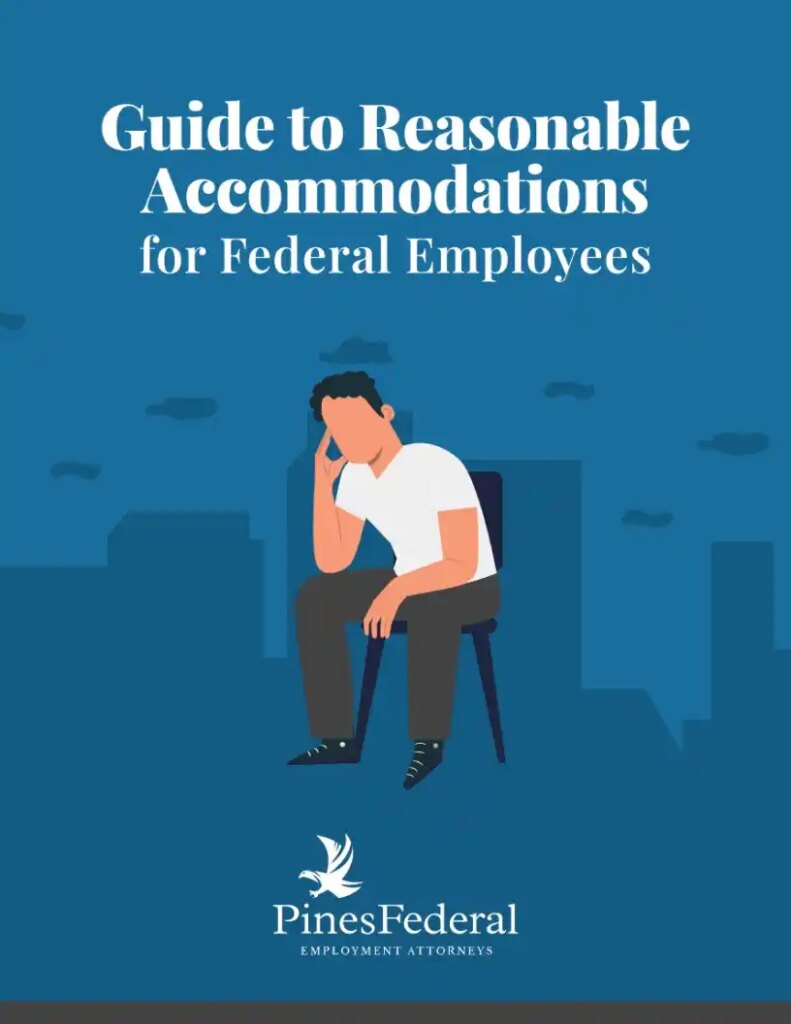
Many people are familiar with the discomfort and exhaustion of the occasional sleepless night.
However, when you have a sleep disorder, getting the rest you need to function is a constant uphill battle that can negatively impact your health, relationships, and job performance.
This blog post will explain what federal employees should know about getting accommodations for sleep disorders at work.
Our reasonable accommodations attorneys will start by tackling a common question: Is a sleep disorder a disability? Then, we’ll discuss sleep disorder reasonable accommodations for federal employees and the process for requesting one in the workplace.
Please don’t hesitate to contact us online or call (800) 801-0598 today for assistance.


“I was so pleased working with Pines Federal. I had peace of mind knowing I would not have to deal with the federal agency and all was taken care of by Pines. They are professional and responsive. I was very happy with the outcome of my case. Hiring Pines was the best decision I made.”
What Do Sleep Disorders Look Like?
A sleep disorder is a neurological condition that often impacts the timing and quality of your sleep.
Common types of sleep disorders include:
- Insomnia—difficulty falling or staying asleep at night;
- Hypersomnia—persistent sleepiness during the day and extreme difficulty waking up with alarms;
- Narcolepsy—overwhelming daytime drowsiness often characterized by sudden episodes of falling asleep;
- Sleep apnea—a condition involving abnormal nighttime breathing patterns that disrupt oxygen intake and sleep; and
- Restless legs syndrome—a sleep movement disorder characterized by leg discomfort at night.
When the symptoms of your sleep disorder interfere with essential parts of daily life, you could be entitled to reasonable accommodations and discrimination protection in the workplace under the Americans with Disabilities Act (ADA).
Are Sleep Disorders a Disability Under the ADA?
Sleep disorders often qualify as disabilities under federal law. Under the ADA, a person has a disability when a physical or mental impairment substantially limits them in a major life activity, such as walking, seeing, breathing, hearing, and speaking.
As of 2008, the ADA officially recognized sleeping, reading, concentrating, thinking, and communicating as significant life activities whose disruption could also qualify as disabling.
Depending on its type and severity, a sleep disorder can seriously impact your health and personal safety.
Some common limitations that people with sleep disorders experience can include:
- Challenges concentrating,
- Extreme fatigue,
- Low stamina,
- Muscle weakness,
- Memory problems,
- Drowsiness, and
- Irregular breathing.
Importantly, even if you control your condition with medication, you can still qualify for sleep disorder reasonable accommodations.
Federal employees are entitled to disability accommodations as long as their condition would interfere with a significant life activity when active.
What Are Reasonable Accommodations for Sleep Disorders in the Workplace?
Under federal law, a workplace accommodation is a change to the work environment that helps employees perform their essential job duties despite their disability.
Some examples of workplace accommodations for sleep disorders include:
- Changing work hours. Shifting your schedule to avoid periods when your symptoms are most disruptive can help manage a sleep disorder at work. For example, someone with hypersomnia may request more morning shifts if their drowsiness is more severe in the latter half of the day.
- Policy changes. Altering attendance policies can benefit employees who suffer from sleep disorders. For example, an employee who is repeatedly late to work due to a condition could request an extended 30-minute grace period to account for post-waking brain fog, with the option to make up their work time at the end of the day.
- Providing special equipment. Specific devices and office equipment can help employees manage drowsiness and fatigue during the workday. This equipment could include a standing desk, personal fans or heaters, blue light filters, or anti-sleep headsets.
- Time and space to nap. Designated nap breaks and a quiet space to rest can help employees manage drowsy episodes during the workday.
- Consistent scheduling. Keeping work hours consistent week-to-week can help employees manage their symptoms and ensure better performance during the workday.
- Remote work. Individuals with narcoleptic episodes or conditions that prevent them from maintaining regular work hours can struggle to fulfill their responsibilities in an office setting. Working at home can help employees with unpredictable or severe conditions better manage symptoms and complete tasks efficiently.
Depending on your condition, you can even identify other ways to manage the impact of your sleep disorder at work safely.
Remember that just because the law entitles you to request disability accommodations doesn’t mean that your employer has to give you your first choice.
According to the ADA, accommodations have to be “reasonable.” Employers can’t be forced to grant an accommodation request that puts an undue administrative or financial hardship on them.
How to Request Reasonable Accommodations for a Sleep Disorder
The ADA sleep disorders accommodation process is much more informal than employees expect. Simply inform your employer that you have a medical condition and need certain alterations to help you fulfill your job duties.
You can do this in a simple conversation, but it’s a good idea to put your request in writing so you have it documented.
Explain the limitations you face because of your condition and describe the specific accommodations that would help you overcome them. Be aware: your employer can ask for certification from a doctor while reviewing your sleep disorder work accommodations request.
From here, you and your employer will work together to identify what changes are both feasible for them and beneficial for you.
This can often take time and creativity. However, the law requires your employer to collaborate with you until you reach a compromise.
Defending the Rights of Federal Employees
The attorneys at Pines Federal have spent over two decades demystifying the ins and outs of employment law for government workers.
As a firm exclusively dedicated to representing federal employees, our attorneys deeply understand the unique rights and challenges that federal workers face.
If you’re struggling to get the disability accommodation you need, contact our office today. Our attorneys have over 60 years of combined experience representing federal workers, and we’re ready to help you.
Get started by calling (800) 801-0598 or filling out our online form today.
[DOWNLOAD] Reasonable Accommodations for Federal Employees
